 10 citations,
January 2014 in “Journal of prosthodontic research”
10 citations,
January 2014 in “Journal of prosthodontic research” Bioengineered salivary glands in mice can produce saliva when tasting sour or bitter, but have different protein levels and nerve signals compared to natural glands.
![Discovery of 7-Methoxy-6-[4-(4-Methyl-1,3-Thiazol-2-yl)-1H-Imidazol-5-yl]-1,3-Benzothiazole (TASP0382088): A Potent and Selective Transforming Growth Factor-β Type I Receptor Inhibitor as a Topical Drug for Alopecia](/images/research/9620bd26-3366-4f2a-bcac-f511697bbc41/small/35997.jpg) 6 citations,
January 2013 in “Chemical & pharmaceutical bulletin/Chemical and pharmaceutical bulletin”
6 citations,
January 2013 in “Chemical & pharmaceutical bulletin/Chemical and pharmaceutical bulletin” A new compound shows promise as a topical treatment for hair loss.
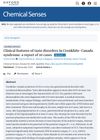 December 2024 in “Chemical Senses”
December 2024 in “Chemical Senses” Taste disorders in Cronkhite-Canada syndrome are severe in the front of the tongue but improve with treatment.
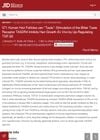 November 2022 in “Journal of Investigative Dermatology”
November 2022 in “Journal of Investigative Dermatology” Activating a bitter taste receptor in hair follicles can stop hair growth by increasing a specific growth factor.
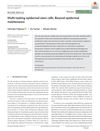 23 citations,
November 2018 in “Development, Growth & Differentiation”
23 citations,
November 2018 in “Development, Growth & Differentiation” Epidermal stem cells have various roles in skin beyond just maintenance, including forming specialized structures and aiding in skin repair and regeneration.
 May 2023 in “Indian journal of science and technology”
May 2023 in “Indian journal of science and technology” The new deep learning system can accurately recognize hair loss conditions with a 95.11% success rate.
 133 citations,
September 2013 in “Nature Reviews Molecular Cell Biology”
133 citations,
September 2013 in “Nature Reviews Molecular Cell Biology” Different types of stem cells and their environments are key to skin repair and maintenance.
1 citations,
June 2019 in “Oral diseases”  24 citations,
June 2021 in “Journal of the European Academy of Dermatology and Venereology”
24 citations,
June 2021 in “Journal of the European Academy of Dermatology and Venereology” Use specific tools to measure quality of life in alopecia areata patients and improve future treatments.
5 citations,
May 2020 in “Journal of the American Academy of Dermatology” AGA might indicate higher risk for severe COVID-19.
 1 citations,
March 2010 in “Hair transplant forum international”
1 citations,
March 2010 in “Hair transplant forum international” Quality control is important for tasks done by surgical assistants.
 October 2021 in “Cosmoderma”
October 2021 in “Cosmoderma” Hair loss can be managed with treatments like minoxidil, finasteride, and others, but there are still gaps in effectiveness and off-label usage is increasing.
 December 2013 in “Appetite”
December 2013 in “Appetite” A defective gene causes hair loss and taste insensitivity in BTBR mice.
 1540 citations,
October 2008 in “Fertility and Sterility”
1540 citations,
October 2008 in “Fertility and Sterility” The report concludes that PCOS is mainly a condition of excess male hormones and its definition may change as new information is discovered.
1 citations,
September 2007 in “Hair transplant forum international” Comparing hair restoration techniques is hard due to many variables and inconsistencies.
 1 citations,
July 2023 in “Cancers”
1 citations,
July 2023 in “Cancers” Skin side effects from CDK4/6 inhibitors in breast cancer patients are generally mild and treatable, allowing most patients to continue treatment.
 February 2025 in “Journal of the European Academy of Dermatology and Venereology”
February 2025 in “Journal of the European Academy of Dermatology and Venereology” Erosive pustular dermatosis of the scalp can occur about 17 weeks after starting EGFR inhibitors, and early minocycline may help manage it.
 2 citations,
October 2023 in “Dermatology practical & conceptual”
2 citations,
October 2023 in “Dermatology practical & conceptual” More research is needed to understand hair and scalp disorders in people with skin of color.
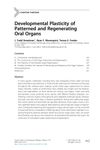 5 citations,
January 2015 in “Current Topics in Developmental Biology”
5 citations,
January 2015 in “Current Topics in Developmental Biology” Fish teeth and taste bud densities are linked and can change between types due to shared genetic and molecular factors.
 November 2020 in “Holistic Nursing Practice”
November 2020 in “Holistic Nursing Practice” COVID-19 can cause hair loss, loss of taste and smell, skin changes, and eye problems.

Penicillamine can cause taste problems due to copper loss, which can be fixed with copper or zinc supplements.
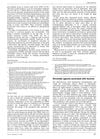 33 citations,
February 1996 in “Lancet”
33 citations,
February 1996 in “Lancet” Losartan can cause temporary loss of taste.
 1 citations,
March 2010 in “Internal medicine journal”
1 citations,
March 2010 in “Internal medicine journal” A 72-year-old man with sudden taste issues and hair growth was diagnosed with a severe stomach cancer and died within 5 months.
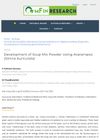 February 2024 in “ComFin Research”
February 2024 in “ComFin Research” The soup mix with Avarampoo is a tasty, healthy alternative to energy drinks, offering various health benefits.

Women often choose food based on taste and availability, not health benefits, leading to a lack of awareness about healthy eating.
66 citations,
June 2020 in “Advanced Intelligent Systems” Surgical robots have improved but still can't perform tasks or make decisions on their own.
1 citations,
January 2023 in “OALib” Fatigue, loss of taste and smell, and cough are common long-term symptoms after COVID-19.
 June 2022 in “International Journal of Advanced Research in Science, Communication and Technology”
June 2022 in “International Journal of Advanced Research in Science, Communication and Technology” Multivitamin gummies with various vitamins and minerals offer a tasty and easy-to-digest alternative to traditional supplements.
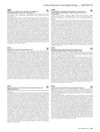 September 2019 in “Journal of Investigative Dermatology”
September 2019 in “Journal of Investigative Dermatology” Different staff in a dermatology clinic understand mostly their own tasks, not the full clinic process.
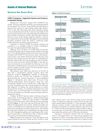 213 citations,
December 2020 in “Annals of internal medicine”
213 citations,
December 2020 in “Annals of internal medicine” Many COVID-19 patients still have symptoms like fatigue and loss of taste or smell a month after diagnosis.

![Discovery of 7-Methoxy-6-[4-(4-Methyl-1,3-Thiazol-2-yl)-1H-Imidazol-5-yl]-1,3-Benzothiazole (TASP0382088): A Potent and Selective Transforming Growth Factor-β Type I Receptor Inhibitor as a Topical Drug for Alopecia](/images/research/9620bd26-3366-4f2a-bcac-f511697bbc41/small/35997.jpg)






















